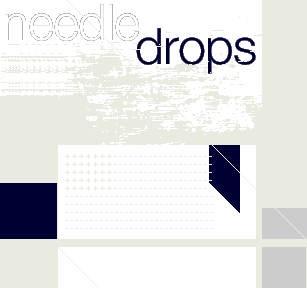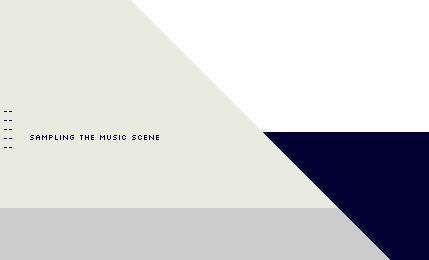


++ Contact Philip Sherburne ++
++ Recently ++
Tuesday, November 29, 2005 = The Stooges Unearthed (Again)
Tuesday, November 8, 2005 = Documenting Beulah And DCFC
Tuesday, November 1, 2005 = Out-Of-Control Rock 'N' Roll Is Alive And Well
Tuesday, October 25, 2005 = Just In Time For Halloween
Monday, October 3, 2005 = The Dandyesque Raunch Of Louis XI
Monday, August 15, 2005 = The Empire Blues
Tuesday, August 9, 2005 = David Howie's Sónar Diary
Monday, July 25, 2005 = Hot Sounds For Summertime
Monday, June 27, 2005 = Overcoming Writer's Block At Sónar 2005
Monday, June 4, 2005 = Cool New Sounds To Download Or Stream
++ Needle Drops Archives ++
View full list of Needle Drops articles...
|
|
 |
Friday, November 29, 2002
++ Ever The Optimist
++ Perhaps it's a logical extension of the utterly dismal state of affairs in the world, but many of the music critics I know are feeling pretty low these days. Of course, the end of the year's always an exhausting time in the biz, as we sift through 52 weeks' worth of releases in the attempt to compile those infernal top-10 lists. But a sense of critical exhaustion also pervades many a review these days, and hangs even heavier over even more private discussions.
A New York journalist threw up his typewriting hands in an email this week, despairing at the thought that the music industry — and, by extension, the media covering (and colluding with) it — had reached "a new low." (Evidence cited: J-Lo, Christina "Back those Chaps Up" Aguilera, Kelly Osbourne, Phil Collins, et al.) An English editor mused in an email to me that perhaps "the whole half century of pop music we've just witnessed is actually a historical blip," noting the increasingly decadent nature of popular music: "More and more money invested and extracted around such a diminishing return of content, such an absolutely fatuous (almost insultingly so) bunch of music, especially in the post-9/11 environment."
++ What is "popular music" today? The very nature of populism seems up for grabs, as pundits debate whether or not Bush's approval ratings have granted the Republicans a "mandate" to mount a broad, ideological attack on the body of law protecting the environment, consumers, and civil rights from an array of well-moneyed special interests. Likewise, in popular music, the term itself seems to be in question. The New York Times recently reported how the number of debut artists breaking into the top 20 has plummeted in the last decade, due in large part to the way record labels and radio conglomerates have raised barriers to entry. (In order to sell records, one needs radio play, but in order to gain radio play, one needs the vast sums of money to buy the airtime — a bit of a Catch-22 for all but those few artists the majors have deemed safe investment choices. In the 1970s we had AOR; today all that remains is ROI.)
Perhaps I'm not one to talk about popular music — I don't listen to the radio, wouldn't know Jay-Z from Ja Rule, and would be hard pressed to identify nine songs out of the top 10 in any given week. I had to go to Vienna to find out who Las Ketchup were (and I'm still sorry I found out). But lately I've been dismayed by the lack of a common cultural currency. Most of what does attract a quorum of listeners seems tainted by corporate interest and debased by its own crapulence. In short, it sucks — although I know many a critic fervently in support of the new Justin Timberlake, say.
But where are the underground scenes, movements, genres, whose role it is to bubble up and offer another option (at least, until their ultimate co-optation)? The '80s brought us punk, post-punk, hip-hop, and indie rock; the '90s brought an explosion of post-rave alternatives, from techno to drum 'n' bass to the various semi-"experimental" scenes. But the oughties feel like a period of stunted growth: UK garage seems to have gone up in a puff of smoke (though Simon Reynolds has chronicled an interesting, if troubling, development in the form of gabba-garage and what my friend Dave Stelfox calls "hooligan house"). Electroclash is (was?) largely a product of jaded media professionals. Dance-rock (The Rapture, Out Hud, Radio 4, et al) has its appeal, but what's the future in a genre grounded so solidly in a set of well-established tropes? And as genres continue to splinter (a phenomenon I've championed in the past), where's the common ground for those of us looking for an alternative to Clear Channel brand pop? Are we destined to collapse into a non-coalition like a nationwide network of local Green Parties, forever arguing over whether puke or puce best represents our true colors?
++ Full disclosure: I'm sure my own position is colored by a sense of professional frustration. For better or for worse, I've staked out my terrain as the advocate of various unpopular or semipopular musics, and as advertising dollars dry up and those musics become, frankly, even less popular, the magazines that pay my bills are less and less inclined to devote column inches to unknown quantities. In the '90s, landing an electronic act in the pages of a lifestyle rag was as easy as touting some half-assed dot-com stock; nowadays, though, editors are looking for results. And results, for the most part, come from extant popular approval (in the form of album sales, "buzz," other magazine articles, in the manner of all cultural feedback loops). So even in the "edgy," streetwise publications, gone are the Fourtets and Caurals and Andrea Parkers (I still can't believe I got her into *Surface), and in come The Raptures, The Faints, The Strokes. None of the latter are necessarily bad, of course, but I'm struck by the all-or-nothingness of the proposition: electronics are out like last week's recycling (unless you live in NYC, where Bloomberg believes that the practice doesn't make economic sense — apparently he's never met the administrator of James Brown's back catalogue). In other words, it appears, some days, that I chose the wrong horse.
Does this make me love the music, "my" music, any less? No! Except maybe that, well... for whatever reason, "electronic music" has been getting staler and staler recently. Is there just too much product out there? Probably. Is it getting more mediocre? Doubtlessly. The number of records I buy in any given week remains steady, and the number flooding into my mailbox is increasing, if anything, but the proportion that knocks my socks off continually shrinks. My attitude toward top 10 lists says something about my musical malaise. I can't remember anything that came out before, say, June; it's been buried in the slag-heap of aluminum that appeared in subsequent months. And anything that's come out in the past 30 days I probably won't venture to list, just because it's too new. How, after a month, can I proclaim its status as a classic? I'm second-guessing myself more and more these days, liking something and then flip-flopping, or refraining from making a call at all. I'm a rabbit in the headlights of the industry.
++ Of course, I've picked up a slew of great records this year, across the spectrum of genres. I was shocked to realize that Seiji's "Loose Lips," for instance — a rocking, broken garage tune on Bitasweet — came out in '02, just because it seemed I'd been living with it for so long. In fact, I'd venture to say that my own mix sets are vastly different than they were only 12 months ago, thanks to the many amazing pieces of wax I bought in 2002, many of which are of recent vintage. Then why so glum, chum?
I'm wondering if it's time to abandon my allegiance to movements and microgenres, in large part because every time a coherent strain appears (microhouse, IDM, glitch-hop), it's quickly drowned out by a chorus of copycat voices warbling just off-key. (Not only was The Langley Schools Project a fascinating document of populist reclamation of popular music, it was also a strangely apt metaphor for the way culture bounces through a succession of funhouse mirrors. Most art, it turns out, is really a kind of art brut, but without the patina lent by hillbillies, mental patients, or chimpanzees, it mostly just sucks.) I've always hated the claims of artists, or more often, publicists, to be "defying genre" (in fact, that's a bullet point in a forthcoming column on pet peeves), but goddamn, son: the most interesting records I'm finding lately are oddballs, perversions, lost li'l doggies strayed far from the fold.
++ I'm thinking of records like Philip Quehenberger's over-the-top, trash 'n' roll electro meatgrinder mayhem bassfuck on Cheap records. Like Shinto's (with Hans Platzgumer) weird Tom-Waits-meets-Tom-Ze-meets-Raymond-Scott (or something) (p)operatic pulp electro on Playhouse. Like Harco Pront's way weird new 12-inch on Music for Speakers, a nine-track 12-inch (on 45!) stuffed with grimy, two-minute gems, each one a masterpiece of overdriven R&B like a collision of D'Angelo, Theo Parrish, and Prince, all played through cheesecloth on a turntable made of wood.
No, none of these people are probably going to wind up in any lifestyle magazines any time soon, despite my most persistent (or annoying) efforts, and they're certainly not going to be moving many units. But who cares? This shit excites, it gets the blood moving, it pisses off the neighbors. Isn't that what rock 'n' roll has always been about? Which isn't to say it's merely loud, or weird, or novel (on another note, I finally discovered Lou Reed's Metal Machine Music, which turns out to be one of the most beautiful records of the 20th Century, and makes several decades of its heirs, from Merzbow to Kevin Drumm, a lot less shockingly new, as good as they may be). It can rock a dance floor — you should've seen the guy grooving to Harco Pront last night, shimmying like a jellyfish, in an empty club, juggling the spangles of the disco ball in time to Pront's lopsided soul. He felt it. Maybe that's all the populism I need.
|
| |
|